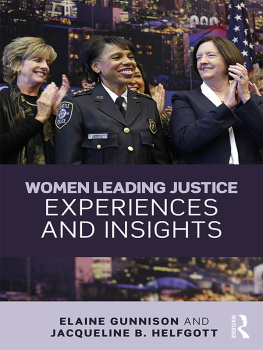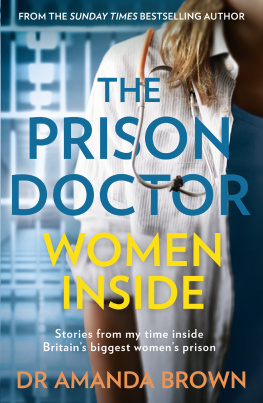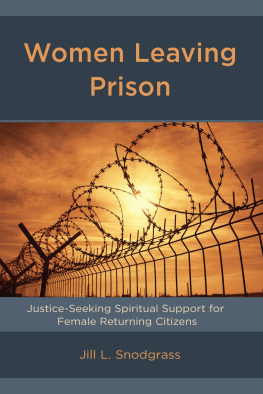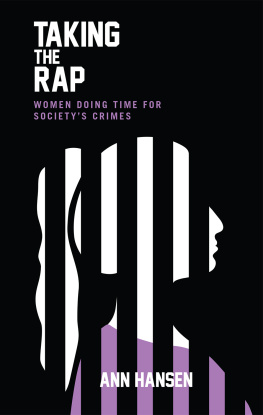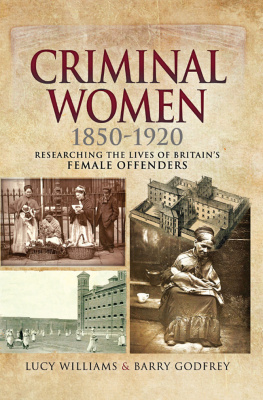Womens Transitions from Prison
Women continue to be one of the fastest growing groups of offenders with an increasing group of women involved in the criminal justice system around the world. Whilst internationally women comprise a low percentage of the total prison population, there is an escalating use of custody inextricably linked to the high levels of personal and social needs of women involved in the justice system. This book presents original research undertaken with Corrections Victoria, Australia, which examines the effectiveness of services and programmes women access in prison and after release, and the impact of this on successful reintegration into the community and on other trends such as reoffending.
Victorias Department of Justice introduced the Better Pathways strategy in response to a growing number of women entering the Victorian corrections system, and the concerning extent to which prison is used for women with inadequate accommodation and complex treatment and support needs. The strategy was developed to address the causes of womens offending and to try and help break the cycle of womens reoffending, by funding more holistic initiatives to support women in their transition to life after prison. It is well acknowledged that pathways into offending by women can also be the factors that most affect their reintegration.
The research outlined in this book presents data about individual womens pathways through the programmes offered as part of the Better Pathways strategy and the views of the women themselves about the effectiveness of these programmes. Negligible research attention has been paid to what services and programmes are effective for women after prison. This book addresses this gap and provides a cohesive presentation of the key issues salient to the needs of women offenders.
Rosemary Sheehan is Professor in the Department of Social Work at Monash University, Australia.
Chris Trotter is Professor in the Department of Social Work at Monash University, Australia, and Director of the Monash Criminal Justice Research Consortium.
International Series on Desistance and Rehabilitation
Edited by Stephen Farrall
University of Sheffield
Editorial Board
Ros Burnett, University of Oxford
Thomas LeBel, University of Wisconsin-Milwaukee, USA
Mark Halsey, Flinders University, Australia
Fergus McNeill, Glasgow University
Shadd Maruna, Rutgers University, USA
Gwen Robinson, Sheffield University
Barry Godfrey, University of Liverpool
The International Series on Desistance and Rehabilitation aims to provide a forum for critical debate and discussion surrounding the topics of why people stop offending and how they can be more effectively reintegrated into the communities and societies from which they came. The books published in the series will be international in outlook, but tightly focused on the unique, specific contexts and processes associated with desistance, rehabilitation and reform. Each book in the series will stand as an attempt to advance knowledge or theorising about the topics at hand, rather than being merely an extended report of specific a research project. As such, it is anticipated that some of the books included in the series will be primarily theoretical, whilst others will be more tightly focused on the sorts of initiatives which could be employed to encourage desistance. It is not our intention that books published in the series be limited to the contemporary period, as good studies of desistance, rehabilitation and reform undertaken by historians of crime are also welcome. In terms of authorship, we would welcome excellent PhD work, as well as contributions from more established academics and research teams. Most books are expected to be monographs, but edited collections are also encouraged.
A full list of titles in this series is available at: https://www.routledge.com/criminology/series/ISODR. Recently published titles:
8. Offending and Desistance
The importance of social relations
Beth Weaver
9. Therapeutic Correctional Relationships
Theory, Research and Practice
Sarah Lewis
10. Rehabilitation Work
Hannah Graham
11. Being and Becoming an Ex-Prisoner
Diana F. Johns
12. Womens Transitions from Prison
The Post-Release Experience
Rosemary Sheehan and Chris Trotter
First published 2018
by Routledge
2 Park Square, Milton Park, Abingdon, Oxon OX14 4RN
and by Routledge
711 Third Avenue, New York, NY 10017
Routledge is an imprint of the Taylor & Francis Group, an informa business
2018 Rosemary Sheehan and Chris Trotter
The right Rosemary Sheehan and Chris Trotter to be identified as authors of this work has been asserted by them in accordance with sections 77 and 78 of the Copyright, Designs and Patents Act 1988.
All rights reserved. No part of this book may be reprinted or reproduced or utilized in any form or by any electronic, mechanical, or other means, now known or hereafter invented, including photocopying and recording, or in any information storage or retrieval system, without permission in writing from the publishers.
Trademark notice: Product or corporate names may be trademarks or registered trademarks, and are used only for identification and explanation without intent to infringe.
British Library Cataloguing in Publication Data
A catalogue record for this book is available from the British Library
Library of Congress Cataloging in Publication Data
Names: Sheehan, Rosemary, author. | Trotter, Chris, author.
Title: Womens transitions from prison : the post-release experience /
Rosemary Sheehan and Chris Trotter.
Description: Abingdon, Oxon ; New York, NY : Routledge, 2018. |
Series: International series on desistance and rehabilitation ; 12 | Includes
bibliographical references and index.
Identifiers: LCCN 2017015137| ISBN 9781138210288 (hardback) | ISBN
9781315455693 (ebook)
Subjects: LCSH: Women prisoners--Deinstitutionalization. | Female
offenders--Rehabilitation. | Women ex-convicts.
Classification: LCC HV8738 .S46 2018 | DDC 365/.647082--dc23
LC record available at https://lccn.loc.gov/2017015137
ISBN: 978-1-138-21028-8 (hbk)
ISBN: 978-1-315-45569-3 (ebk)
Typeset in Times New Roman
by HWA Text and Data Management, London
The International Series on Desistance and Rehabilitation aims to provide a forum for critical debate and discussion surrounding the topics of why people stop offending and how they can be more effectively reintegrated into the communities and societies from which they came. The books published in the series will be international in outlook, but tightly focused on the unique, specific contexts and processes associated with desistance, rehabilitation and reform. Each book in the series will stand as an attempt to advance knowledge or theorising about the topics at hand, rather than being merely an extended report of specific a research project. As such, it is anticipated that some of the books included in the series will be primarily theoretical, whilst others will be more tightly focused on the sorts of initiatives which could be employed to encourage desistance. It is not our intention that books published in the series be limited to the contemporary period, as good studies of desistance, rehabilitation and reform undertaken by historians of crime are also welcome. In terms of authorship, we would welcome excellent PhD work, as well as contributions from more established academics and research teams. Most books are expected to be monographs, but edited collections are also encouraged.


